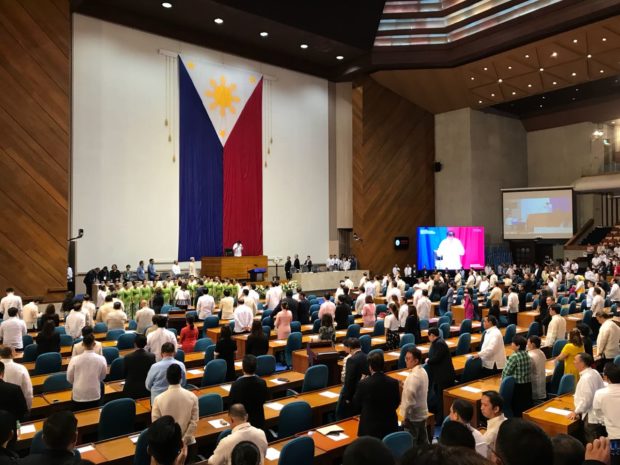Senators explain why they voted ‘no’ to martial law extension

PHOTO by RYAN LEAGOGO / INQUIRER.net
MANILA, Philippines — Despite failing to stop a third extension of martial law in Mindanao, senators still explained on Wednesday why they voted against the request of President Rodrigo Duterte’s administration.
Senator Francis Pangilinan said during the joint session that the 1987 Constitution allows the imposition of martial law only for a limited period.
“We reiterate that martial law under the 1987 Constitution is an extraordinary measure imposed only under the extreme situation of actual rebellion or invasion and only for a limited period,” Pangilinan explained.
The senator also added that martial law should have been limited to Marawi in the first place.
“We voted against a Mindanao-wide martial law for a period of six months the first time because the actual rebellion and siege was taking place in Marawi only and if it were to be imposed it should have been limited to the Marawi area, precisely because it is an extraordinary measure where actual rebellion is taking place,” he said.
Article continues after this advertisement“And only for a limited period. We cannot understand how two years can be defined as a ‘limited period,’” he added.
Article continues after this advertisementCongress recently approved another extension of martial law in Mindanao — this time until 2019 — despite strong opposition from minority lawmakers.
The Senate and the House of Representatives voted jointly. On the part of the Senate, there were 12 who voted in favor, five who voted against, and one abstained.
All in all, 235 members of the Congress approved Duterte’s request, while 28 went against it, plus Senator Ralph Recto who abstained.
READ: Congress okays 3rd martial law extension in Mindanao
READ: 12 Senators OK third martial law extension in Mindanao
New normal?
Explaining his “no” vote, Drilon reiterated his earlier claim that there is no basis for the extension of martial law in Mindanao, as there is no actual uprising in the southern part of the country.
“The Constitution is clear that martial law may be declared only in cases of actual rebellion when public safety requires it. The elements of rebellion are well-settled. It is committed by rising publicly and taking arms against the government for the purpose of removing from its allegiance the territory of the Philippines or any part thereof,” Drilon explained.
He, along with Senator Francis Escudero also asked if resorting to martial law has become a norm for law enforcement agencies.
“The persistence to continuously place Mindanao under martial law, without any clear showing of actual rebellion, makes me wonder: Is this the new normal?” Drilon asked.
“Martial law cannot be the new normal in Mindanao. I wish Mindanao will continue to achieve peace and progress not because of the taint of martial law. Let us give credit to ourselves, not martial law,” Escudero added in a separate statement.
READ: No Mindanao uprising to justify martial law extension—Drilon
READ: Escudero: Can lawmakers extend martial law past their terms?
Drilon also likened martial law to a short-term solution — like an antibiotic, which is taken if simpler medicines failed to work.
“Ang martial law po ay parang antibiotic. It is resorted to only when ordinary over-the-counter drugs have ceased to work. Unlimited resort to this powerful medicine desensitizes the body and eventually no longer becomes effective in providing the protection that it was designed to give,” the opposition senator explained.
“Martial Law is a measure of last resort. We must not resort to it when other, less extreme measures are available. If martial law is reduced to become part of the Mindanaoan’s everyday reality, what recourse do we have left if despite such military rule, the problem in Mindanao is not solved?” he noted.
ML extension and 2019 polls
According to Senator Risa Hontiveros, this particular extension of the martial law in Mindanao has more weight because it covers the 2019 midterm elections.
“Like the past extensions, I find no cogent rationale for martial law that our existing legislation, and the capacity of our military forces, cannot address,” Hontiveros said in her speech after Congress voted.
“But unlike the previous extensions of July 2017 and December 2017, this new extension poses a new set of threats — specifically because the new extension period will cover the May 2019 elections,” she added.
The senator also doubted whether the administration can keep its promise of peaceful and orderly elections, given its track record and the history of martial law rule, in reference to the regime of former President Ferdinand Marcos.
“The Executive has intimated that martial law will ensure the more orderly conduct of elections, and that it will prevent violence and lawlessness from tarnishing the electoral process. But both historical precedent and the track record of this administration give us reason to doubt,” Hontiveros said.
“Noong 1978, ginamit ng diktador na si Ferdinand Marcos ang militar at ang dagdag na kapangyarihan nito para ipanalo ang kanyang mga kandidato at para patahimikin ang mga kritiko. At ang pakikitungo ng administrasyong Duterte sa kanyang mga kalaban […] ay nagsasabi sa atin na hindi nagkakalayo si Ginoong Duterte sa nasirang diktador,” she claimed. /jpv